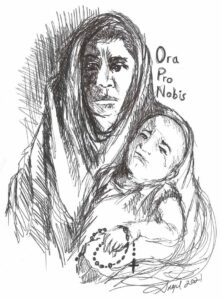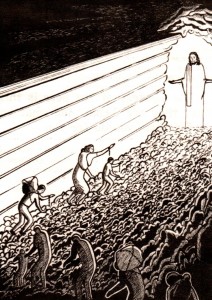We left Venezuela together, having faith in God that we would arrive at our destination. The lack of basic necessities and the organized delinquency in our country obliged us to go out, fleeing, leaving behind our loved ones and a part of our lives. We were my husband, my son and I, but we were also accompanied by my sister-in-law, her husband and their two daughters.
As we began our journey, we headed to our sister Republic of Colombia. We arrived in the city of Medellin, then took a bus to Necoclí, with the thought that from that place we would take a boat to Panama City, but we were surprised to find that these trips were no longer made because Panama had closed its borders.
When we learned of this news, we asked how the journey was toward Capurganá, in order to go through the stretch that is the border between Colombia and Panama through a jungle called Darien. A part of our odyssey began from that moment. Thousands of Haitians wanted to cross in this same way. We had to wait from Wednesday to Saturday to board the boat that would carry us to the jungle.
When we arrived on this small island we could see the enormous mountain that we thought to cross. We began to hear of the dangers we would face in crossing that jungle, which included rapes, attacks and mistreatment, even death. We were filled with terror, but we were already there and we had to continue our journey.
In that place there were many coyotes trying to lead people to cross. We went with one who inspired the most trust in us. Thus we began our jungle journey. We can say that we found that day one of the most dangerous places where we had ever been.
Already on the first day walking and at the beginning of the first mountain, we could see a body on the side of the road. When we asked our guide about it, he said that the person had been bitten by a snake.
That first day we arrived at the first camp, and we said among ourselves that this was not so difficult, but in reality we had hardly started. On the journey we were with a large group in which there were persons of various nationalities, but the largest group were Haitians.
At dawn, the whole camp began to take apart their tent in order to begin walking again. This day we had to cross various hills. The guide told us we had to walk fast, because having children we always were falling behind the group and this day we had to go through what is called the Hill of Death. In these mountains there are always criminals. Our walk began and in the late afternoon we came to a river. We decided to rest and wait there for my sister-in-law and her family. When they arrived, we continued on.
We started to go up what would be the last mountain of the day, but in a few minutes, night began to fall. It was hard to distinguish the path. We started to hear noises of animals that come out at night and our fear grew. We had no flashlight and didn’t know where to walk. The mud made it very difficult, because many times our boots were completely buried. In this moment of desperation, we began to ask God to take care of us.
A moment later, a group of Haitians who were coming behind us caught up with us and passed us. But the leader of the group, upon seeing us with children and very desperate, decided to stay with us and accompany us. This man was very tall and big and carried a large flashlight that lit the way very well. He said that if we needed to rest we should do so, but our anxiety to arrive at the camp made us say no. Even though we were worn out, we only wanted to get there. At that moment two men armed with shotguns came down from the other side, coming back. We thought they would rob us, but they only said, “Go up, it’s only one more hour’s walk.
We walked about two hours and still had not arrived. We understood later that it was because we walked very slowly. But after three hours, we began to come down the mountain and we heard the voices of people. It was the camp. We arrived at 11:00 p.m. The Haitian man told us that we had arrived. He left us and we did not see him again. On the following day, we decided to look for him to thank him, but we did not find him.
We decided not to wait for my sister-in-law because we didn’t want anything to happen. We spoke with her so that she would try to walk faster.
The third day the mountains were steeper. A number of people helped us with our child. Each day the way was more complicated. The guide of our group abandoned us, only giving us directions that we should walk to the river, and once there we only had to walk to the edge in order to come to the first camp in Panama. The National Guard of Panama was there and they would help us. There would be no more big camps; we would only need to walk and camp when night fell.
On the road we could see things like women miscarrying and hear terrible things such as, “They killed so and so, they raped that woman, they robbed another.”
On the fourth day, my son and my husband began to feel bad, with vomiting and diarrhea from drinking contaminated water. Those were desperate days, because they could hardly walk. My husband had to carry our son on his back, since we had no food and nothing dry to put on my son or give him to eat. We only could ask people who were close by. We were there two days until we arrived at where there were canoes that took us to the camp,
We walked for another six days, but thanks be to God, although we were weak and somewhat ill, we arrived. My sister-in-law and her family arrived three days later. Her husband had hurt his foot. He almost lost it. T
We passed the second camp and came to the third, everyone in canoes. At the third camp my brother-in-law received medical attention for his foot and from there a bus left us at the border of Panama and Costa Rica. We rested there in the capital of Costa Rica.
Then we continued our journey to the border of Costa Rica and Nicaragua. We crossed in an irregular manner because they were charging $150 per person for documents and we did not have it. On the way, the police stopped us, but thanks be to God they let us go.
At the border of Nicaragua and Honduras we took a bus to Tegucigalpa. There in the capital of Honduras we had to wait for my brother-in-law who had a complication of an infection in his foot. They hospitalized him there for four days.
One night my husband went out to the market and someone tried to rob him with a pistol, but the hand of God has always been with us and is with us.
In Mexico in Tapachula we tried to take out documents to cross legally. But the time to wait for an appointment was very long, almost four months, so we decided to go on to the state of Tabasco. Mexican Immigration arrested us and we were five days in Immigration custody. Then they took us to a shelter with open doors.
A Surprise!
I began to feel bad with vomiting and feeling discomfort. My husband took me to a doctor and to our surprise, I was expecting a baby. But this came with complications. Because of injuries in the jungle, a hematoma had formed in my uterus.
We were twenty days in the shelter in Tabasco and sanitary conditions were bad. My son became ill with salmonella, which made us try to go out again and continue on our way. Two weeks later, we succeeded in arriving at the border at Acuña, full of uncertainty of what would come next.
We crossed the Rio Grande River. Three days later in the land of the United States, the Border Patrol took us to a border station. We were filled with fear of a possible deportation. We were processed and allowed to go. They took us to a church where they gave us food and clothing, because the Border Patrol had thrown everything away.
From the border we had to travel to Chicago. But the person who was going to receive us, because of family problems, could not receive us. We called Casa Juan Diego to see if they could receive us and the answer was positive. Now we are here, receiving love and attention from these marvelous persons. But we have a problem. At the Border Patrol, they did not process us correctly and even though all the people at Casa Juan Diego tried through many ways to obtain an “A” number for us, they could not.
Because of this, we have to travel to Chicago to go to Immigration there to check in and be more at peace. And so the story continues….
Houston Catholic Worker, Vol. XLII, No. 1, January-March 2022.



